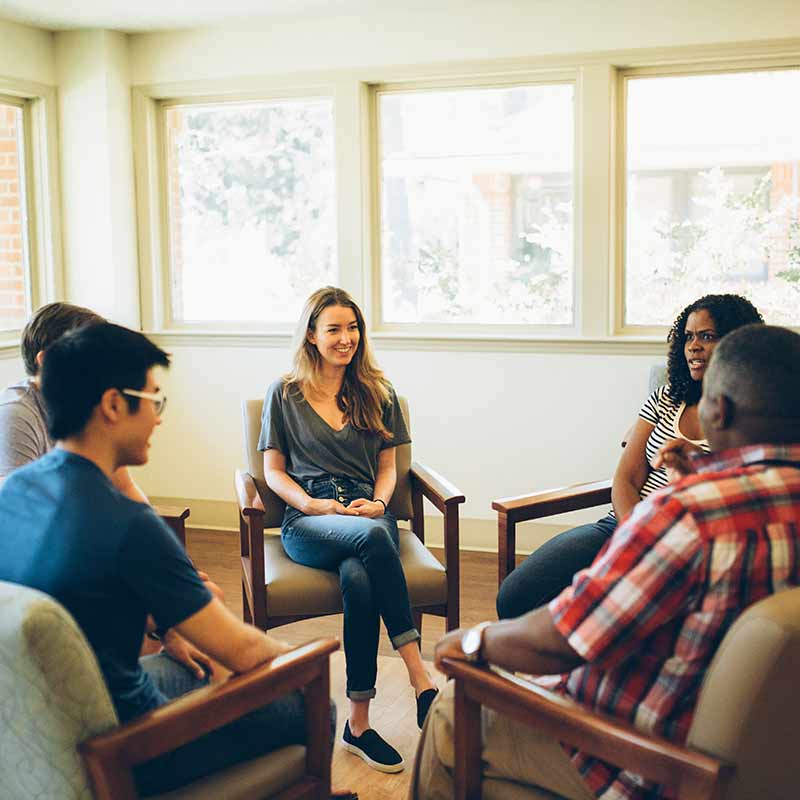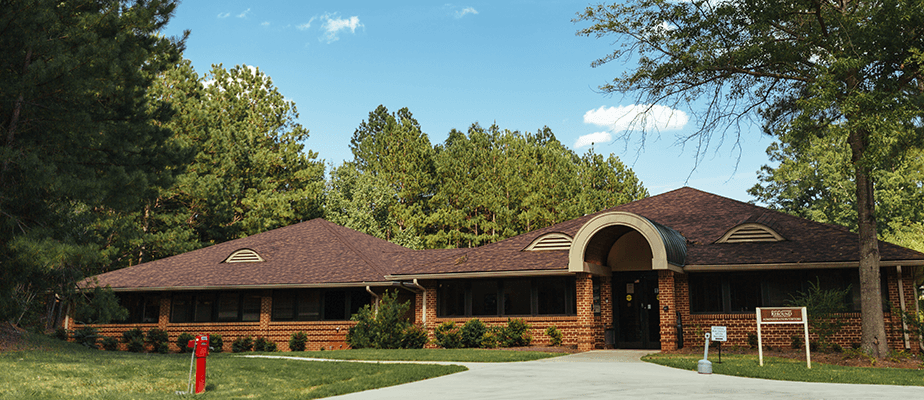Rebound Behavioral Health Hospital helps adults struggling with prescription drug addiction build a strong foundation for long-term recovery. Serving South Carolina, Rebound is a trusted provider of substance abuse rehab.
About Prescription Drug Addiction
Learn More About Prescription Drug Addiction & Treatment at Rebound Behavioral Health
Prescription drug abuse is defined as the use of prescription medication in such a way not intended by the prescribing physician. This type of behavior can include taking another person’s prescription medication as well as crushing and injecting pills as a means to get high. Individuals who are addicted to prescription medications will continue to abuse them even if they are causing a number of negative consequences. Since these drugs are prescribed by a physician and regulated by the FDA, many people mistakenly assume that they are safe. This is not the case, in fact prescription drugs act the same way as illegal drugs do and can lead to very serious consequences.
We understand that seeing a future without the use of prescription medications seems impossible, that you would not be able to get through the day. However, with the right rehab and support, change is possible. The friendly staff at Rebound are dedicated to providing our clients with a compassionate and secure environment to work through their issues. If you are struggling with abuse or addiction or prescription medication, you don’t have to suffer alone. As the leading prescription drug rehab and treatment center around Lancaster, our staff is here to help.
How to Help a Loved One
Helping a Loved One Get Treatment for Prescription Drug Addiction
Having a loved one who is struggling with a prescription medication addiction can leave you struggling with feelings of anger and concern. While on one hand you are worried about their safety and wellbeing, on the other you don’t understand why they would want to destroy their lives. Watching the person you love slowly slip away can be heartbreaking and leave you wondering what you can do to help them. Here are a few tips that can help you to talk to your loved one about getting treatment:
Educate yourself: Take the time to educate yourself about prescription medication abuse and addiction, the symptoms that may be present, and the effects your loved one may be experiencing. This will also help you understand more about the disease of addiction. Also, by educating yourself you will be knowledgeable when the time comes for you to talk to your loved one about the matter and seeking treatment.
Empathize: While it may be hard to empathize with someone who is causing themselves harm, take the time to think about the circumstances that may have led to the development of the abuse and addiction. They can be struggling with a number of different circumstance that you don’t know about and be in a significant amount of pain, so try to be empathetic to their specific situation. When you talk to them, make sure that you actually listen and don’t minimize any of their feelings or experiences.
Offer support: If your loved one agrees that they need to seek rehab at at treatment center for prescription drug addiaction, be there to support them through the whole process. Offer to make appointments for them and go with them to those appointments, listen to what the doctors have to say and take notes. While they are in treatment, take the time to check in to see how they are doing. Reassure them that you will be there throughout the whole recovery process.
Seek support: In addition to helping your loved one, it is also important to remember that you have needs as well. Look into local support groups around your community that can help offer you support and allow you to process your own emotions so that you don’t get burnt out.
Why Consider Treatment
Why Consider Inpatient Treatment for Prescription Drug Addiction at Rebound Behavioral Health
Abuse and addiction to prescription medication is a serious illness that can have many negative consequences in your life. Becoming addicted to medication can cause problems at home, at work, with school, and in your closest relationships. As your drug use increases, you become more dependent on the substance and it begins to take over every aspect of your life to the point where all you care about is obtaining and using more pills. Additionally, abusing these medications can cause a whole host of negative physical problems. In severe cases, it can cause death as a result of overdose or suicide.
Treatment centers that specialize in substance abuse treatment for prescription medications are a very effective way to help individuals get clean and get back on their feet. Rehab provide you with the tools you need to continue to be successful with your sobriety. Through a variety of different treatment methods you will learn more appropriate coping skills, how to manage your stress, pain management, and relapse prevention. Additionally, treatment centers can help mend broken relationships with family members by allowing the time for you to work together expressing feelings and how the abuse has affected the family unit as a whole. When you have completed rehab for prescription abuse at a treatment center, they will provide you with the resources needed to continue your treatment.
Our Rehab Philosophy
Rebound Behavioral Health’s Rehab Philosophy
As the best prescription drug rehab in South Carolina, we believe in using a holistic approach to treatment, allowing us to integrate wellness in the body as a whole. Our approach to substance abuse and addiction is to provide individuals with as many skills as possible so that they are able to cope with daily stressors in a more productive and healthier manner. Our interdisciplinary treatment team will work closely with you to identify your specific treatment goals and will do everything they can to help you to meet them. Patient input is very important to us, we want you to be able to recognize your positive qualities and to once again live a full and enjoyable life without the use of medications. Our accepting and compassionate environment provides the perfect setting for you to begin your healing process.
Treatment Methods
Types of Prescription Drug Addiction Treatment Offered at Rebound Behavioral Health
The treatment services offered at our rehab center for prescription drug abuse is a combination of medication management and a variety of psychotherapy approaches. Our treatment experts will take the time to meet with each patient to identify specific concerns and develop a plan that will help them reach their personal recovery goals. Upon arriving at our treatment center, each individual will undergo a series of comprehensive assessments to determine their level of addiction, the kinds of substances in their body, and the existence of any co-occurring mental health disorders. Depending on your level of addiction, you will begin your treatment process through our detox services where toxins will be quickly and effectively removed from your body. We will have medication management to help relieve some of the unpleasant symptoms associated with withdrawal. It is important to note that the detoxification process is only a first step in the treatment process and further treatment is necessary in order to help prevent relapse.
In addition to medication, there are a number of other treatment options offered at our treatment center. We use individual therapy to address any personal issues that may be related to your substance abuse and try to understand the underlying cause that may have led you to begin abusing pills in the first place. Each patient meets daily with their doctor to review progress made in the program, set additional goals, and make any necessary changes.
Cognitive Behavioral Therapy (CBT) is a form of therapy in which negative thoughts about yourself and your environment are confronted in order to change unwanted behavior, such as prescription drug abuse. Through cognitive behavioral therapy we will help you learn how to recognize your negative thinking so that you are able to appropriately react to certain situations. Additionally, we will help you to recognize, cope with, and even avoid situations in which you are most likely to engage in substance abuse.
Group therapy is the treatment method that we employ during rehab. There are numerous groups held on a daily basis that will cover a wide range of topics. Some of the different groups include process groups, psycho-educational groups, and skill based groups. Our group therapy sessions are run by the unit social worker and are designed to help individuals work through issues that may be of concern to them, while at the same time getting input from staff and peers.
Family therapy is an essential part of the rehab process here at our prescription drug treatment center addiction problems usually affect the whole family. Family sessions are used to address any family dynamics that may have contributed to the development of your prescription drug abuse as well as allowing your loved ones the time to process their own emotions. On Sundays, family education sessions will be held to teach your loved ones more about the disease of addiction and medication abuse. If necessary we will help connect family members to substance abuse support groups and other additional community resources so they are better able to cope with their own struggles.
Our prescription drug addiction treatment center offers additional methods outside of traditional therapy models to help you recover from you prescription drug abuse. These include:
- Journaling
- Music Therapy
- Recreational Therapy
- Relaxation Therapy
- Massage
- Pet Therapy
- A.A. and N.A.
Discharge & Continuing Care
Maintaining your Recovery from Prescription Drug Addiction
Once it has been established that you no longer need inpatient care, an individualized discharge plan will be created by you and your treatment team. Depending on your needs, you may join our outpatient treatment. If you and your treatment team believe that you have made enough progress to return home in, you will be given a list of referrals for traditional outpatient therapies available in your area, or elsewhere as well as an A.A. or N.A. group.


















